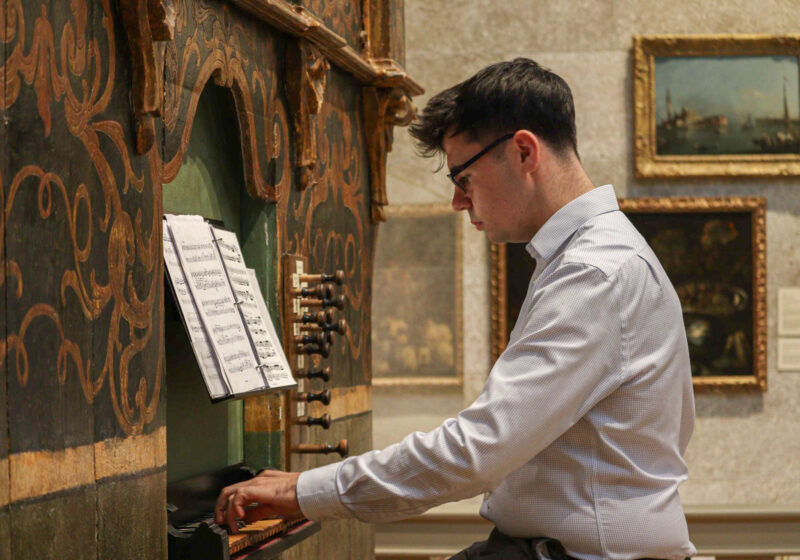The Reverend Jesse Jackson spoke in Strong Auditorium on Tuesday night as the featured speaker for the Sixth Annual Martin Luther King Jr. Day Commemorative Address. He passionately spoke to a responsive crowd about many topical issues and also spoke at length about what he thought King’s vision really was. His comments and ideas for the future all reflected the evening’s theme of linked fate, one of King’s concepts – “injustice anywhere is a threat to justice everywhere.”
When Jackson spoke about King, he both praised King’s actions and challenged the conventional way of analyzing King’s thoughts. He related a story about King’s last birthday at which Jackson was present. King had organized a group of leaders from a number of communities and ethnicities in a church. The group began to plan a sit-in in Washington, and the meeting went on until someone entered the room with cake and punch and reminded King that it was his birthday.
Jackson spoke at length about the true meaning of King’s iconic “I Have a Dream” speech. He said that the focus should not be on the dream, but on the broken promise that King spoke of, or rather the many promises that African-Americans have seen go unfulfilled, starting with Lincoln’s Emancipation Proclamation.
“We got the proclamation but not the emancipation,” Jackson said.
Jackson noted that while the dream was more marketable, the message of the speech was about the promise.
“We came to Washington that day? to address the broken promise,” he said. Jackson made it clear that King was not loved in his day by many people, but hated a large number of whites and feared by many blacks. It was only through the passage of time that the image of King was reversed.
Jackson also stressed that despite all the current problems in this country, a lot of good has come out of King’s and others’ work.
“I think what gives me the most hope is the progress we’ve made in our 42 years of [voting],” he said, citing the profound changes that African-Americans have made in music, art and politics. “We’re able to raise issues that matter.”
Jackson said that merely being able to have a voice is important.
“Every battle we have fought, we have won,” he said. “We have not won a battle that we have not fought.” He mentioned every major battle from slavery to the right to vote, and pointed out that while many of those battles took a long time, they were eventually won.
“We now live in the King democracy, not the Jefferson democracy,” he said.
Jackson actively encouraged those in the audience to follow in King’s footsteps and get involved, advising students not to be complacent in their college years.
“[King] did not waste his time in the earlier laps of the race,” he said.
Jackson discouraged students from putting off the prime of their lives until middle age. When a student pointed out that students find it hard to fit political activism into their tight schedules, Jackson replied that they are here to learn about and change the world, and part of that experience is being involved in it. After his speech, he called up all the students who were not registered to vote and had them sign registration forms.
“It’s not enough to admire Dr. King, we must follow him,” he said.
Earlier in a press conference, Jackson said that one reason young people today are apathetic is that they are the beneficiaries of last generation’s reforms. However, he said that the system is cyclic.
“This generation’s beneficiaries have obligations to be benefactors for the next generation,” he said, citing the abundance of health care and tuition problems.
The issues that Jackson spoke about were varied, but mostly affected minorities and the poor. He spoke at length about the high incarceration rate and the high cost of tuition, always relating his point back to the fact that money funding the “un-winnable” war in Iraq could be redirected toward better causes. He noted that in Pakistan, doctors often receive $40,000 a year to go to medical school.
“They make smart doctors, while we make smart bombs,” he said.
Jackson also has a big problem with the prison system in this country. He said that the states use prisons to build revenue and in the last 10 years, half of all public housing built has been jails. He also noted that in every state in the Union there are more African-Americans in jail than in college and that reformed convicts have difficulty finding jobs.
At his press conference, Jackson showed reporters a picture of an overcrowded jail full of African-Americans from the front page of last Saturday’s Richmond Times-Dispatch and likened it to a slave ship. The jail, he said, was meant to house 860 but held 1,500 at the time of the picture, a problem that leads to violence, sex and later HIV/AIDS. He implied that the picture was iconic for this generation.
Jackson was originally scheduled to speak on Friday, Jan. 26, but had to reschedule when his son woke up paralyzed from the waist down. However, his son is now able to walk, and appears to be on the road to recovery.
Jackson received much applause when he spoke about the city directly and the economic problems facing Eastman Kodak.
“When Kodak closes and the factory lights are shut off, when they turn off the lights there is no difference between black and white,” he said. “But we must turn the lights back on.”
Wrobel is a member of the class of 2010.
For more pictures of the event, click here.




